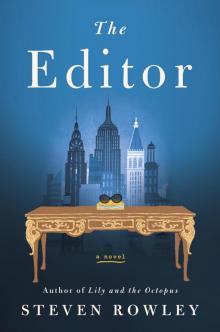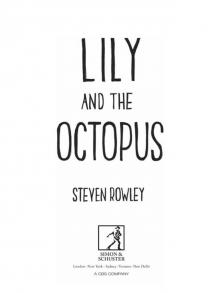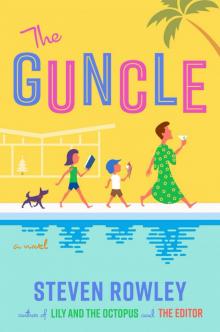- Home
- Steven Rowley
The Editor
The Editor Read online
ALSO BY STEVEN ROWLEY
Lily and the Octopus
G. P. PUTNAM’S SONS
Publishers Since 1838
An imprint of Penguin Random House LLC
penguinrandomhouse.com
Copyright © 2019 by Ten Wry Wolves, Inc.
Penguin supports copyright. Copyright fuels creativity, encourages diverse voices, promotes free speech, and creates a vibrant culture. Thank you for buying an authorized edition of this book and for complying with copyright laws by not reproducing, scanning, or distributing any part of it in any form without permission. You are supporting writers and allowing Penguin to continue to publish books for every reader.
LIBRARY OF CONGRESS CATALOGING-IN-PUBLICATION DATA
Names: Rowley, Steven, author.
Title: The editor : a novel / Steven Rowley.
Description: New York : G. P. Putnam's Sons, [2019]
Identifiers: LCCN 2018042427| ISBN 9780525537960 (hardback) | ISBN 9780525537977 (epub)
Subjects: | BISAC: FICTION / Literary. | FICTION / Family Life. | FICTION / Historical.
Classification: LCC PS3618.O888 E35 2019 | DDC 813/.6—dc23
LC record available at https://lccn.loc.gov/2018042427
This book is a work of fiction. Any references to historical events, real people, or real places are used fictitiously. Other names, characters, places, and events are products of the author’s imagination, and any resemblance to actual events or places or persons, living or dead, is entirely coincidental.
Version_1
Contents
Also by Steven Rowley
Title Page
Copyright
Dedication
Epigraph
The Quarantine: A Novel by James Smale
Dreams | February 1992Chapter One
Chapter Two
Chapter Three
Chapter Four
Chapter Five
Chapter Six
Chapter Seven
Chapter Eight
Go Your Own Way | July 1992Chapter Nine
Chapter Ten
Chapter Eleven
Chapter Twelve
Chapter Thirteen
Chapter Fourteen
Yesterday’s Gone, Yesterday’s Gone | November 1992Chapter Fifteen
Chapter Sixteen
Chapter Seventeen
Chapter Eighteen
Chapter Nineteen
Chapter Twenty
Chapter Twenty-one
Chapter Twenty-two
Everything Turned Around | December 1992/1993Chapter Twenty-three
Chapter Twenty-four
Chapter Twenty-five
Chapter Twenty-six
Chapter Twenty-seven
Chapter Twenty-eight
Chapter Twenty-nine
Chapter Thirty
Chapter Thirty-one
Chapter Thirty-two
Chapter Thirty-three
What Tomorrow Will Do | May 1994Chapter Thirty-four
Chapter Thirty-five
Chapter Thirty-six
Acknowledgments
About the Author
For my parents
In short, there’s simply not
A more congenial spot
For happily-ever-aftering than here
In Camelot.
—Camelot, lyrics by Alan Jay Lerner
THE QUARANTINE
A Novel by James Smale
The room was warm, too warm, Russell thought, to share with a dead body, but no one seemed concerned. Guests wore their coats cinched tight at the waists, as if taking them off would obligate them to stay. In the back of the room a giant silver percolator was brewing coffee, and there was another kettle for tea. His mother, having had three cups black, did laps around the room like the women who exercised inside the Pyramid Shopping Center—mall milers, they called them—somehow connecting with anyone in her path and simultaneously avoiding everyone.
“Look at her,” Russell said, watching his mother’s path from his vantage point by the casket. “When this is over I swear I’m going to lock her in a room.”
“Who?” Sean tried to follow his brother’s moving gaze.
“Mom.”
“Mom? Why?”
“Why?” Wasn’t it obvious? She’s all they had left. He tugged at his tie. “Is it warm in here?”
“Very.”
Russell ran his hand across the closed casket; his father had it worst of all, stuffed inside in the suit he hated and wore only to church. Or maybe he had it best. If only Russell could give his father some air. “She has to answer some things.”
Sean offered his hand to the Speighs as they approached and gave him and his brother, the sons of Dick Mulligan, a solemn nod. “Thank you for coming.”
“Dick was a good man,” Mr. Speigh said, his nose twice the size it once was, not from the lie but from age. “It’s a shame what he d—”
“. . . what happened,” Mrs. Speigh corrected, tugging at her husband’s arm. No one wanted to say it out loud.
“Your father had some of my tools . . .”
“Of course,” Sean said. Eventually they would clean out the garage.
“Another time, Arthur.” Fed up, Mrs. Speigh gave her husband a full yank, pulling him toward the door.
Sean waited until their old neighbors were out of earshot. “What things? What does Mom have to answer?”
“Questions! She has to answer questions. Without circling the room, without walking away. Face-to-face. It’s time.”
“Now? You think now is the time. In the wake of . . .”
In the wake of, well, this wake.
“YES.”
“And how will she answer them, these questions, locked in a room.”
Russell stared at his brother, his eyes red, cried out, but overrun with inspiration. “I’m going to lock myself in with her.”
And that’s when the idea for The Quarantine took hold. As his mother, on her umpteenth lap, passed the table with the cups and the saucers and decided they needed restacking. As Sean removed his jacket and rolled up his sleeves like a politician hitting the campaign trail. As his sister, Fiona, held everyone’s hand and listened as the same drab stories were told again and again and again. As his own head throbbed with torment and heartbreak. A quarantine. Russell wouldn’t go home, back to California. He would stay in Ithaca, secured inside a room with his mother until there were no more secrets, until they knew each other as well as two people could. As two people with the same blood should. It was the only way he could make sense of the gunshot that took half his father’s face.
It needed to shatter everything.
Dreams
February 1992
◆ ONE ◆
She moves quickly and with purpose, threading the tight corridor between a hedge maze of cubicles and the string of office doors. Her stride is serious; I have a thousand questions, but the snap to her step suggests I should select only one. Maybe two. Nope, one. I try to take everything in, to remember the details—I’m going to want to recount them later, to relive this in my head—but we’re moving so fast. I see paper. Lots of paper. And push-pins, I think, colorful ones, tacked directly
into the cubicle walls, holding calendars, schedules, memos, and important lists (more paper!) in place. Marketing standees announce titles as Coming Soon, and a parade of book covers framed like art hang evenly spaced on the walls between doorframes, following me down the hall as if I’m viewing them through a zoetrope.
“I’m sorry, where are we going?” Just like that, my one question wasted. And I hate that I apologize. I have been invited here and I need to act like I belong before they figure out that I’m the wrong guy. An imposter. A dupe.
Without looking back, she says, “Conference room. End of the hall.” Then, with barely a pause, “Would you like some water, James?” The sound of my name startles me. Hers is Lila. She told me, by the bank of elevators, where we were introduced. My agent’s assistant told me it was Lisa, but that’s typical Donna. Thank goodness Lila introduced herself before I had a chance to call her by the wrong name. That would have really started things out on the wrong foot. Lila has blond hair, but not so blond that you can’t take her seriously. I really like her shoes.
“No. No water, thank you.” I can’t imagine walking this fast with a glass of water and not sloshing it everywhere, on my sleeve, or—heaven forbid—down the front of my pants. “I’m sorry I was late.” Another apology, but this one is warranted.
“You were five minutes early.”
Was I? “I’m usually ten minutes early, so in that sense I was late.”
Lila ushers me inside the last room at the end of the hall. “Here we are. Conference room.” She stares at me, and for the first time I notice her clothes are impeccably tailored. She’s serious for a beige girl. That’s what I’ve heard people call a lot of young women in publishing. I’m not fond of the term; it reeks of an unnecessary sexism. They’re called that, beige girls, because they wear understated monotones and sweaters to match. But this girl (woman!) is a different animal. Power beige. Like a café-au-lait color, or camel or ecru.
“It’s nice,” I say, about the conference room, which is stupid. It makes me sound impressed, like I’ve never seen such a room before, and of course I have. I’ve worked at pretty much every office in Midtown in a never-ending string of toxic, depressing temp jobs. This conference room is exactly like any other conference room, with a bulletin board, a whiteboard, a phone in the center of a long table (at least I think it’s a phone—it looks somewhat like a light-up game I had as a child), and a set of dry-erase markers.
“It serves a purpose.” Her enthusiasm is considerably less than mine.
Yes, conferencing. For some reason I try to sell her on it. “It has everything. Even a window.” Then, as an afterthought, “Anyone ever jumped?”
“Out the window?” She is appalled. I can tell. She tucks her hair back behind an ear while pursing her lips.
“It’s just . . . I can imagine these meetings get a little . . . I mean, I know I’m feeling . . .” Fraught? Power Beige is just staring at me. “I’m sorry.” I cringe. My third apology inside two minutes. “You’re not interested in my twaddle.”
For the first time in our incredibly brief relationship, she perks up. “I’m interested if you’re going to jump out the window.”
“I promise I’m not going to jump out the window.”
She exhales. Disappointed? Perhaps. “Why don’t you just have a seat, then.” We’ve officially run out of things to say.
Silence.
Which I abhor.
I pull a chair back from the table and start to sit and then stop. There’s a loud ringing in my ears similar to the one I would get as a kid after swimming endless summer hours in Lake George. “I always thought I’d be more of a pills person.”
“More twaddle?” There is the vaguest hint of a smile. She’s joking with me, letting me know to relax.
“Ha, no. It’s just, I don’t like it when other people have to clean up my messes.” Talk of suicide has gone on so long, it may be professional suicide. To change the subject, I try to steer us toward business. “So, my manuscript. You’ve read it?”
“I have.”
I replay that last bit in my head; it doesn’t sit right. “Not that I think my manuscript is one of my messes! I just wanted that to be clear.”
“It was. Clear.” Lila picks up a dry-erase marker from the table and sets it on the lip of the whiteboard. In doing this, she softens slightly. “And even if it wasn’t, that’s an editor’s job sometimes. To clean up.”
“And you’re interested? In being my editor?”
“You ask a lot of questions.”
“It’s nerves, I guess. I tend to . . .” I make a motion with my hands like I’m vomiting words. Lila grabs the corner wastebasket and holds it out for me. She smiles again, this time more broadly. I decide I like her; she has the ability to play along.
“No,” she responds.
“Oh.” I can feel the heat in my cheeks.
“You’re here to meet with someone else.”
“Oh my gosh. I’m sorry. I was told by my agent’s assistant to ask for Lila. Well, she said Lisa, but she can’t read her own handwriting.” I’m going to have real words with Donna for putting me in this predicament.
“James, it’s okay. I set up the meeting for you and this editor.”
“And he liked it? The editor I’ll be meeting with?”
“She.”
“Sorry.” Apology number four! I wince. This must be some sort of record.
“Take a deep breath. We’re not really in the business of calling writers in to personally tell them how much we didn’t like their work.”
A wave of relief. “No. I don’t suppose that’s the best use of anyone’s time.”
“It’s easier to do that in a letter.”
“I received plenty of those,” I say, before realizing how unvarnished that truth sounds. “Well, not plenty. A normal amount.” Pause. “Lila.” I use her name as punctuation, unsure if it sounds like an exclamation point or a period.
She pulls the chair out farther and pats the back of it. “It won’t be long now. If you’d like to have a seat.”
I sit before I get myself in any more trouble, and she leaves the room, closing the door behind her. I swear I can hear her chuckle on the other side before heading off down the hall.
Alone, I rifle through my bag to make sure I have a copy of my manuscript, should they ask to see it. I do. I walk over to the window and press my forehead against the glass to look straight down at moving vehicles that look like Matchbox cars. SPLAT. That would do it. I cross back to the phone. What was the name of that game? Simon. There’s one visible button, and without thinking, I push it. It beeps loudly and I jump, but then there’s a dial tone. I push the button again, quickly, and it stops. I pray the commotion doesn’t summon Lila. She would not be pleased.
I’ve been a writer for ten years. Since I graduated college. Or maybe it’s twenty-five years. Depending on when you start counting. My mother had an old Swiss Hermes typewriter when I was growing up; I have no idea where she acquired it or why she had it, but it was a thing of beauty to me. It was robin’s-egg blue and came with a lid that clamped to the typewriter itself, turning it into a stylish, if heavy, attaché. The keys clacked and the bell dinged and I always pulled the lever for the carriage return like I was casting the deciding vote in a crucial election.
“You’re not writing about me, are you?” I remember my mother asking, when I was only seven or eight years old. Like many of her questions, she delivered it more like a command.
“No,” I would say, and at the time that was the truth. My stories were small, trite, about cats and the neighbors with the horse stables and a pond in the woods that wasn’t much more than a puddle. But I felt they carried literary heft once they were typed. To me, typing was akin to publishing. I lived for that typewriter, and I would agonize when the ribbon became twisted, or the keys stuck, and I needed my mother’s a
ssistance. She didn’t prioritize typewriter repair the same way I did. When I would point this out to her she would roll her eyes and say, “One day you can tell your therapist.” She said that about a lot of things. But instead of getting a therapist, I became a writer. Instead of telling one person, I aspire to tell the world.
I rearrange the thumbtacks in the bulletin board on the wall into a peace symbol before having a seat. At least I think it’s a peace symbol. It may be the Mercedes-Benz logo. I often get those two confused, so I get back up to undo my work in order to keep my mind on track.
I had some early success. As a writer. Two short stories published in two different literary journals. With typical youthful naïveté, I thought it would always be that way, but, of course, it wasn’t. I took odd jobs to pay bills, convincing myself the whole time that these jobs provided life experience—essential to a writer who wants to have something important to say. But I don’t have much insight from these experiences to share other than how to make coffee and remain invisible in a room full of people and battle a growing depression. It’s been years now since I’ve had anything published, so long that I wonder if it’s still acceptable to call myself a writer. That thought in itself is depressing, so I sit. Someone, an editor, is finally interested in my work, I remind myself, and I have to make the most of this nibble. I have to turn it into a bite.
Then I have to turn that bite into a sharklike chomp.
As soon as I’m settled in the chair the door opens. A woman enters, immediately turning her back to me so that all I can see is her slender frame and that she is a brunette and tall. She closes the door, taking pains to do so as gently as possible.
I scramble to my feet, knocking a knee against the table with a deafening whack. And even though I want to scream out in pain, to sink back into the chair and massage my leg, when she turns around and I meet her gaze, I stop. And then, strangely, I begin to bow.
Because . . . because . . . I don’t know the protocol.

 The Editor
The Editor Lily and the Octopus
Lily and the Octopus The Guncle
The Guncle